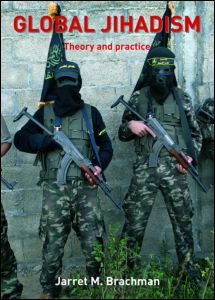|
Reviewed by Paul Kamolnick, Ph.D., Associate Professor of Sociology at East Tennessee State University Jarret Brachman, a former Fellow in the Central Intelligence Agency’s Counterterrorist Center, has openly declared that the single greatest tactical failing in the current War on Terrorism is the institutional failure to strategically analyze as war fighting creed, doctrine and strategy of the global jihadist movement. During his tenure as leader of the Combating Terrorism Center (CTC) at the United States Military Academy, West Point, he worked with his staff and senior scholars to change the military’s understanding of global jihadist terrorism. No longer at the CTC, Brachman has taken his years of scholarly research and real-world experience and authored a remarkable and valuable resource for scholars interested in the phenomenon of global jihadist terrorism, Global Jihadism: Theory and Practice. Brachman’s book is a major contribution to jihadi strategic studies and will be invaluable to academic researchers and military strategists whose knowledge of global jihadism is lacking, grossly inadequate, or circumscribed by a suicidal political correctness. The chief objective of Global Jihadism is, as Brachman states, to provide “an explanation of global Jihadist praxis, or the ways in which theories are translated into practice.” The book, in the author’s words, is “an attempt to make a body of complex thought and previously obscure personalities accessible to a Western audience. It is, above all else, an effort to show that big ideas can have big consequences.” Brachman begins by providing a general orientation to the global jihadist phenomenon—identifying core beliefs, major catalytic events and reasons propelling its rise. From there, he establishes a tiered framework for disaggregating the jihadi movement and moves into a highly detailed discussion of the several schools of Salafism (i.e. ‘originalist’ and/or puritanical reformist Islamist tendencies), as well as an analysis of the five major theological-ideological doctrines underpinning the global jihadist movement—Creed, Tawhid,Takfir, Al-Wala wal-Bara, and Jihad. The remainder of the first part of Global Jihadism ably details the key ideologues categorized as Awakening-oriented Salafists, Rejectionists and global jihadists, and examines the core strategic objectives underpinning the global jihadist campaign to universally impose Sharia rule. Part Two of Global Jihadism begins with a detailed description of global jihadism’s major propagandists and propaganda organs and moves to detailed descriptions of global jihadism in Saudi Arabia and Britain. Brachman’s concluding chapter offers several specific strategies drawn from the history of warfare for containing in the short run, and dismantling in the longer run, the salafist jihadi terrorist movement. One unfortunate flaw of Global Jihadism is its inadequate index. Key terms such as “jihad,” “jihadism,” “Qur’an,” “Hadith,” “Da’wa,” and “Fiqh,” for example, are omitted. Also, Brachman’s too-cursory dissection of the meaning of the concept “jihad” does not satisfactorily suggest the specific legal requirements of the Law of War in Islam and variations among the four major legal schools. Moreover, this book will require a substantive revision in order to be useful for undergraduate or even graduate instruction, one which should include a detailed table of contents, expansive index, and select appendices providing suggestions for additional scholarly research and additional backing. It is also likely that the virtually encyclopedic description of the jihadist universe should be somehow condensed and or potentially committed to more detailed appendices to prevent losing sight of the forest for the trees. There is no book on my shelf that covers the ground that Brachman’s does. His knowledge is that of a deep insider with the highest security clearance, who respects and takes his enemy seriously, and who has written an encyclopedic work that illuminates the underpinnings and strategic vulnerabilities of this latest totalitarian adversary. “If there is a bright side to this global war,” Brachman states, “it is that the jihadist movement offers nothing more than empty rhetoric and wanton bloodshed. It is a bankrupt ideology that, like numerous historical precedents, will eventually collapse under its own internal contradictions. The world cannot simply wait for that to happen, however: it must, and can, accelerate the process of triumph over the global jihadist movement.” And it is works such as Brachman’s that provide just such an accelerant. |


 Global Jihadism: Theory and Practice
Global Jihadism: Theory and Practice